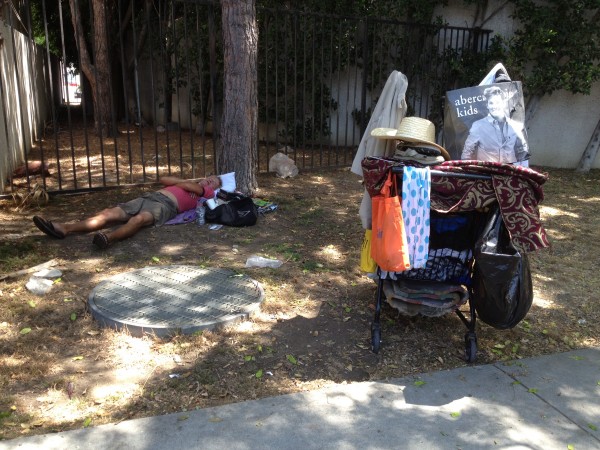
Elected officials and housing advocates from across Los Angeles County reinforced their commitment Tuesday to working together to solve the problem of homelessness, even as communities push back against development in their own backyards.
Supervisor Mark Ridley-Thomas joined Los Angeles City Councilmen Jose Huizar and Marqueece Harris-Dawson on the steps of the Kenneth Hahn Hall of Administration to underline their cooperation.
“The City of Los Angeles has stepped up big time,” Ridley-Thomas said.
The county has developed an agreement that it hopes will serve as a template for providing supportive services, like mental health and substance abuse treatment, to homeless individuals in Los Angeles and other cities. The Board of Supervisors signed off on the document Tuesday and empowered Chief Executive Officer Sachi Hamai to negotiate the details with various municipalities.

The City of Los Angeles brings $1.4 billion in bond funding approved under Measure HHH to the table, while the county’s quarter-cent sales tax increase under Measure H is expected to raise roughly $355 million annually for supportive services. In addition to building more permanent supportive housing, cities can offer rental subsidies through federal housing vouchers.
A combined total of 2,084 federal rental vouchers have been pledged by seven cities — Los Angeles, Burbank, Glendale, Long Beach, Pasadena, Pomona and Redondo Beach — but final agreements have not yet been signed.
The Community Development Commission is also working with Compton, Santa Monica and Culver City to match city assistance with county services.
West Hollywood Mayor John Heilman said pairing supportive services with housing was key.
“What we are seeing on the streets are people having problems with substance abuse and mental health issues and physical challenges, and we can’t get them the help that they need without both shelter and supportive services,” Heilman said.
Homeless advocate Reba Stevens, who was homeless for 21 years, agreed.
“Housing is only the beginning to the end of homelessness,” Stevens told those assembled on the county steps, adding that “guilt and shame” kept her from getting the help she needed for many years.
The county’s goal is to move 45,000 families and individuals from homelessness into permanent housing during the first five years of Measure H, which takes effect October 1. A second target is to prevent another 30,000 families and individuals from becoming homeless during that five-year period.
Harris-Dawson was optimistic about the city’s ability to forge ahead with its projects in spite of community resistance.
“There are almost no projects in the city of Los Angeles that don’t get some pushback,” Harris-Dawson told City News Service outside the county building. “Just because there’s pushback doesn’t mean you can’t get projects done.”
In fact, feedback from the community is helpful because it can serve to tailor projects to suit local needs, the councilmember said.
Heilman said units built by the West Hollywood Community Housing Corp. “blend right in … We have not had the kind of problems that some of the NIMBYs (not in my backyard) raise about this kind of housing in their communities.”
Supervisor Kathryn Barger said city officials would need to help the county convince residents that formerly homeless individuals can be good neighbors.
“The money is not going to be the problem,” Barger said. “The issue is going to be cities willing to step up and allow these types of facilities to be in their community.”
Supervisor Hilda Solis said some cities in her district were “turning their backs on us in many ways. Even in the city of Los Angeles, we have an issue of building some supportive housing right now for veterans and people that have mental illness … NIMBYism is alive and strong.”
Solis suggested providing technical assistance and other resources to some of the smaller municipalities that are afraid to tackle the problem on their own.
Ansell said cities would submit plans next month for county-funded homeless planning grants.
On Sept. 27, the county will host a second city summit on combating homelessness.

I have actually spoken with some of these individuals. Many WANT to live outside. Some are vets in a bad place. MANY have serious, mental health, substance abuse problems and are not functional enough to “rejoin society”. MANY have serious violence tendencies but judges let them out of jail. I spoke with one guy, a strong young Causcasian from North Carolina. He could work tomorrow but would rather panhandle. Good luck throwing our good tax dollars after bad.
Both the County and the City of Los Angeles, the counties largest city, along with the federal government have excess buildings and property that could be utilized to solve the homeless problem. The former public library on Gardner comes to mind. These facilities need not be grand hotels bust instead spaces that can be sub divided for individual use until it’s occupants can survive in a normal environment. Some homeless will never be able to transcend and that should be considered. It’s temporary housing and should be of higher quality than the current homeless shelters but it should not be… Read more »